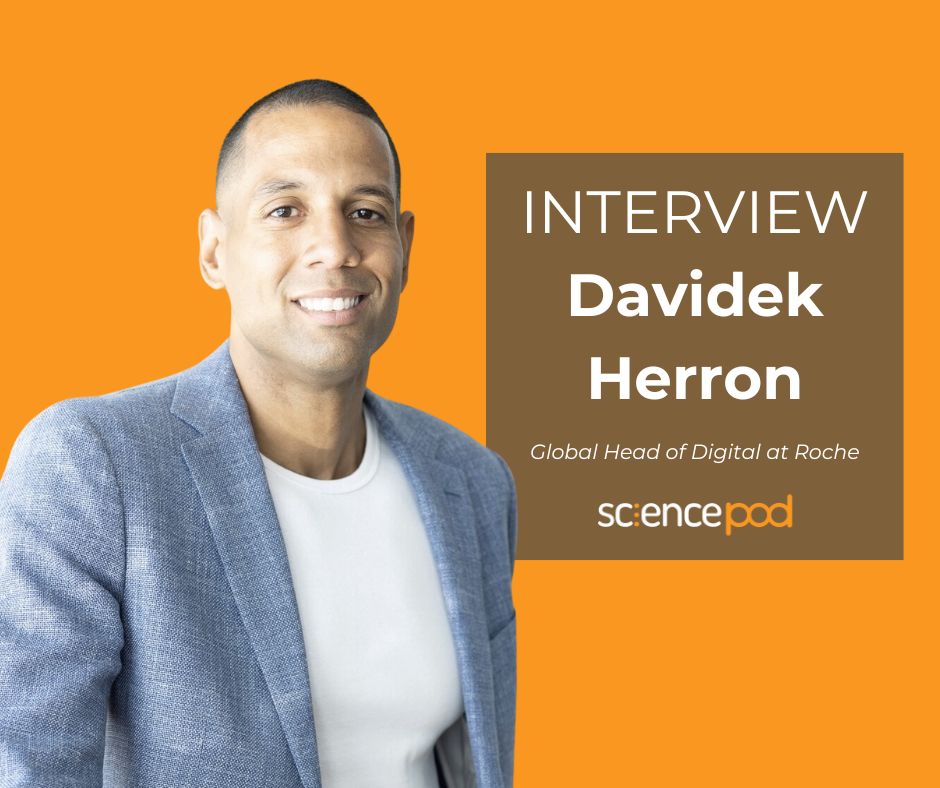Interview with Davidek Herron, Global Head of Digital at Roche
“There is so much more to digital engagement than clever marketing campaigns and it’s going to take a mindset shift within the industry to achieve this,” says Davidek Herron, Global Head of Digital at Roche.
SciencePOD had the opportunity to speak with Davidek in advance of his panel discussion at Reuters Events Pharma 2022. The event will run from 11–13 October at the Nice Acropolis Convention Center, Nice, France, and the panel discussion is entitled “Panel: Enable your full omnichannel capability by taking a de-siloing functional approach to customer engagement.”
“This is less about the importance of developing HCP-centric methods for digital engagement and more about understanding our customers. What do patients need? This is where data and insights come into play, ensuring we’re engaging with our customers, adding value and providing solutions.”
– Davidek Herron
Please explain what your role entails as Global Head of Digital.
My role at Roche centres around leading and driving digital excellence across our global HQ and 70+ affiliates around the globe. This means building high-performing digital strategic and marketing teams and enabling them to deliver the best customer experience when they engage with Roche.
What is the single most important shift you have managed to implement to date, towards the digital transformation of your company?
One of the biggest shifts that we have implemented is the use of data and insights to completely flip the traditional ‘tell and sell’ sales model upside down. The conversation is moving away from “let me tell you about how x product is better than y”, towards “how can we help you to help your patients?” And it’s these technological advances that are driving these large-scale transformations.
What have been the main challenges in doing so?
Access to customers has dramatically shifted over the last decade, which has been further exacerbated by the pandemic. Therefore, we need to ensure that we are meeting customer needs and expectations through more streamlined and creative engagement tactics.
Further to this, the landscape is shifting at pace and so another key challenge is to ensure you’re taking your people on the journey with you, so that they remain engaged and know what they need to do.
What is your ambition for the company, in terms of making its digital transformation more powerful than that of competitors?
Our vision at Roche is bringing 3-5 times more patient benefit at 50% less cost to society. And it’s my passion to work towards achieving this vision, and to get there faster.
Roche is an amazing company, with a deep history of success. We have continuously demonstrated an ability to adapt to the changing needs of stakeholders and the environment we are in, to best serve our patients. As I mentioned to you before, we are moving away from the ‘tell and sell’ model to ‘partner and solve’. This means going beyond selling medicines to healthcare providers, and instead working with them to devise solutions collaboratively.
A big part of this has been implementing our Primary Point of Contact (PPOC) model. Our PPOCs work closely with stakeholders in the healthcare ecosystem and are supported by an integrated digital approach so they have one go-to-person at Roche for any of their needs. This model also enables our PPOCs to collaborate with stakeholders when co-creating and co-implementing solutions for patients. Ultimately, we are working towards making Roche a ‘better version of itself’.
What is your take on the importance of developing HCP-centric methods for digital engagement?
This is less about the importance of developing HCP-centric methods for digital engagement and more about understanding our customers. What do patients need? This is where data and insights come into play, ensuring we’re engaging with our customers, adding value and providing solutions. There is so much more to digital engagement than clever marketing campaigns and it’s going to take a mindset shift within the industry to achieve this.
Do you have any specific views on how communication via digital means will play an increasing role in the patient of the future?
The ultimate goal is to capitalize on the growth we have seen in the digital health space and use this to tackle health inequalities. Increasingly the relationship between health literacy and digital literacy is becoming symbiotic, which is the major global health crisis that we are all grappling with right now.
We need to employ digital communication to reach marginalised patient populations and encourage digital health literacy more widely.

